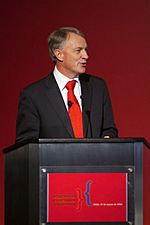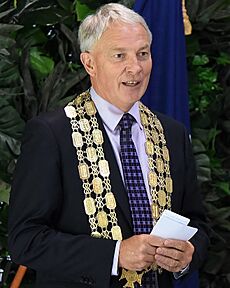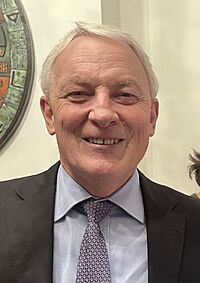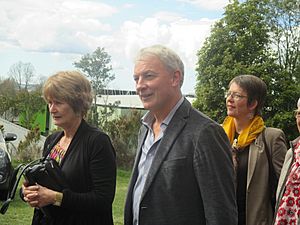Phil Goff facts for kids
Quick facts for kids
Phil Goff
|
|
|---|---|
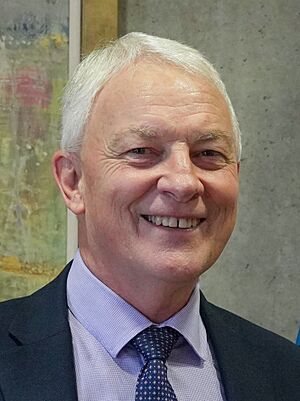
Goff in 2024
|
|
| 33rd High Commissioner of New Zealand to the United Kingdom | |
| In office January 2023 – 6 March 2025 |
|
| Prime Minister | Jacinda Ardern Chris Hipkins Christopher Luxon |
| Preceded by | Bede Corry |
| Succeeded by | Chris Seed |
| 2nd Mayor of Auckland | |
| In office 15 October 2016 – 15 October 2022 |
|
| Deputy | Bill Cashmore |
| Preceded by | Len Brown |
| Succeeded by | Wayne Brown |
| 32nd Leader of the Opposition | |
| In office 19 November 2008 – 13 December 2011 |
|
| Prime Minister | John Key |
| Deputy | Annette King |
| Preceded by | John Key |
| Succeeded by | David Shearer |
| 13th Leader of the Labour Party | |
| In office 11 November 2008 – 13 December 2011 |
|
| Deputy | Annette King |
| Preceded by | Helen Clark |
| Succeeded by | David Shearer |
| 35th Minister of Defence | |
| In office 19 October 2005 – 19 November 2008 |
|
| Prime Minister | Helen Clark |
| Preceded by | Mark Burton |
| Succeeded by | Wayne Mapp |
| 25th Minister of Foreign Affairs | |
| In office 10 December 1999 – 19 October 2005 |
|
| Prime Minister | Helen Clark |
| Preceded by | Don McKinnon |
| Succeeded by | Winston Peters |
| 43rd Minister of Justice | |
| In office 10 December 1999 – 19 October 2005 |
|
| Prime Minister | Helen Clark |
| Preceded by | Tony Ryall |
| Succeeded by | Mark Burton |
| 37th Minister of Education | |
| In office 14 August 1989 – 2 November 1990 |
|
| Prime Minister | Geoffrey Palmer Mike Moore |
| Preceded by | Geoffrey Palmer |
| Succeeded by | Lockwood Smith |
| 9th Minister of Employment | |
| In office 6 April 1987 – 14 August 1989 |
|
| Prime Minister | David Lange |
| Preceded by | Kerry Burke |
| Succeeded by | Annette King |
| 14th Minister of Housing | |
| In office 26 July 1984 – 26 August 1987 |
|
| Prime Minister | David Lange |
| Preceded by | Tony Friedlander |
| Succeeded by | Helen Clark |
| Member of the New Zealand Parliament | |
| In office 6 November 1993 – 12 October 2016 |
|
| Preceded by | Gilbert Myles |
| Succeeded by | Michael Wood |
| Constituency | Roskill (1993–96) New Lynn (1996–99) Mount Roskill (1999–2016) |
| In office 28 November 1981 – 27 October 1990 |
|
| Preceded by | Arthur Faulkner |
| Succeeded by | Gilbert Myles |
| Constituency | Roskill |
| Personal details | |
| Born |
Philip Bruce Goff
22 June 1953 Auckland, New Zealand |
| Political party | Labour |
| Spouse |
Mary Ellen Goff
(m. 1979) |
| Children | 3 |
| Residences | London, United Kingdom |
| Profession | Lecturer |
| Signature |  |
Philip Bruce Goff (born 22 June 1953) is a New Zealand politician and former diplomat. He has had a long career in public service. He was a Member of Parliament for many years, served as the Mayor of Auckland, and was New Zealand's High Commissioner to the United Kingdom.
Goff was a senior minister in the Fifth Labour Government from 1999 to 2008. He held important jobs like Minister of Justice, Minister of Foreign Affairs, and Minister of Defence. He was also the leader of the Labour Party and Leader of the Opposition from 2008 to 2011.
After his time in Parliament, Goff was elected Mayor of Auckland in 2016 and served for two terms. In 2023, he became New Zealand's High Commissioner in London, a role he held until 2025.
Contents
Early Life and Education
Phil Goff grew up in Three Kings, a suburb of Auckland. His family did not have a lot of money. When he finished high school, his father wanted him to start working right away. But Goff wanted to go to university.
This disagreement led to him leaving home at just 16 years old. To pay for his education, he worked at a freezing works and as a cleaner. His hard work paid off. He earned a Master's degree with first-class honours in political studies from the University of Auckland. He was a top student and even lectured in Political Studies while finishing his degree.
Career in Parliament
| New Zealand Parliament | ||||
| Years | Term | Electorate | List | Party |
| 1981–1984 | 40th | Roskill | Labour | |
| 1984–1987 | 41st | Roskill | Labour | |
| 1987–1990 | 42nd | Roskill | Labour | |
| 1993–1996 | 44th | Roskill | Labour | |
| 1996–1999 | 45th | New Lynn | none | Labour |
| 1999–2002 | 46th | Mount Roskill | 7 | Labour |
| 2002–2005 | 47th | Mount Roskill | 6 | Labour |
| 2005–2008 | 48th | Mount Roskill | 6 | Labour |
| 2008–2011 | 49th | Mount Roskill | 3 | Labour |
| 2011–2014 | 50th | Mount Roskill | 1 | Labour |
| 2014–2016 | 51st | Mount Roskill | 16 | Labour
|
Goff joined the Labour Party in 1969. In 1981, he was elected as the Member of Parliament (MP) for the Roskill area in Auckland. An MP is someone elected to represent the people of their local area in the country's government.
Serving as a Cabinet Minister
In 1984, the Labour Party won the election, and Goff became a Cabinet Minister. At the time, he was the youngest member of the Cabinet. A Cabinet Minister is a senior MP who is in charge of a specific government department, like education or health.
Over the years, Goff was in charge of many areas, including:
- Housing: He helped provide loans for families who needed help buying a home.
- Environment: He worked to protect New Zealand's natural spaces.
- Education: He introduced changes to how university studies were funded, including student fees and loans. This was because many more students were attending university than before.
- Employment: He managed job-related issues during a difficult time when many people were unemployed.
In the 1990 election, the Labour Party lost, and Goff lost his seat in Parliament. He spent time studying at Oxford University in England before returning to New Zealand politics. He was re-elected as an MP in 1993.
Minister of Foreign Affairs and Defence
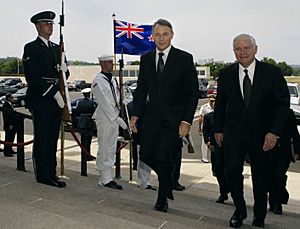
When Labour won the 1999 election, Goff became the Minister of Foreign Affairs and Trade. His job was to manage New Zealand's relationships with other countries.
A key achievement during this time was signing the New Zealand–China Free Trade Agreement in 2008. This agreement made it easier and cheaper for New Zealand and China to trade goods with each other. It took over three years and fifteen rounds of talks to complete.
After the 2005 election, Goff became the Minister of Defence. He was in charge of New Zealand's military and making sure the country was safe.
Leader of the Opposition
After the Labour Party lost the 2008 election, Helen Clark stepped down as leader. Phil Goff was chosen to take her place. This made him the Leader of the Opposition. This role involves leading the main party that is not in government and holding the current government accountable.
During this time, Goff and the Labour Party challenged the government on its plan to raise the Goods and Services Tax (GST). They travelled the country on a tour called 'Axe the Tax' to protest the increase.
Labour did not win the 2011 election. Soon after, Goff stepped down as leader but remained in Parliament as an MP for his electorate of Mount Roskill.
Mayor of Auckland (2016–2022)
In 2016, Phil Goff ran for Mayor of Auckland and won. The mayor is the leader of the city's council. He was the second mayor of the Auckland 'super city', which was formed by joining several smaller councils together.
As mayor, Goff promised to work on important city issues. He wanted to improve public transport and build more houses. He also focused on social issues like helping homeless people.
In 2018, Goff made a decision to not allow two controversial Canadian speakers to use city-owned buildings for an event. He said their views could cause tension between different groups in the community. This decision started a big debate in New Zealand about free speech.
Goff was re-elected in 2019 and served as mayor until he retired from the role in 2022.
High Commissioner to the United Kingdom
In January 2023, Goff began a new job as New Zealand's High Commissioner to the United Kingdom. A High Commissioner is like an ambassador who represents their country in another Commonwealth country.
In May 2023, during an event for the coronation of Charles III, Goff made a mistake by not following the correct Māori protocol. He forgot to say a karakia (a Māori prayer) and made a comment that upset representatives of the Māori King, Tūheitia Paki. Goff later apologized for his mistake.
In March 2025, Goff was dismissed from his role as High Commissioner. This happened after he made public comments about the US President, Donald Trump. The New Zealand government felt his comments were not appropriate for a diplomat.
Personal Life
Phil Goff married Mary Ellen Goff in 1979. They have three adult children. He lives on a small farm in Clevedon, a rural part of Auckland.
In 2017, he was appointed a Companion of the New Zealand Order of Merit for his long service as a Member of Parliament.
Images for kids
See also
 In Spanish: Phil Goff para niños
In Spanish: Phil Goff para niños
 | Roy Wilkins |
 | John Lewis |
 | Linda Carol Brown |


